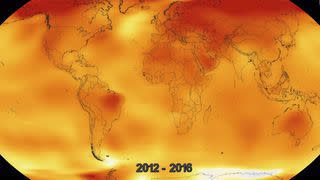8 things Trump said about the Paris Climate Agreement that are total BS

President Trump spoke at length on Thursday about his decision to withdraw the United States from the Paris Climate Agreement.
But much of what he said doesn’t hold water. In fact, it seemed at times that his speech was straight out of a criticism of a 1997 climate agreement the U.S. also joined but then withdrew from: the Kyoto Protocol.
From the legal aspects of the treaty itself, to the effects on U.S. jobs and economic growth, Trump’s address was, as one former U.N. official put it, “factually sooo incorrect.”
SEE ALSO: Here’s why you shouldn’t totally despair if the U.S. ditches the Paris Climate Agreement
“Anybody with Google on their phone can fact-check the many statements that were made today," Christiana Figueres, who helped broker the 2015 Paris accord through years of tough negotiations, said Thursday on a call with reporters.
We’ll make it even easier. Here’s a look at what Trump said, and how he got it wrong:
1. The Paris agreement, if fully implemented with total compliance from all nations, would only limit global temperature rise by two-tenths of 1 degree Celsius — “a tiny, tiny amount”
Not exactly. The agreement sets emissions goals that are designed to be revisited, and presumably made more ambitious, every five years. So the Trump administration’s number appears to be based on a scenario in which countries only live up to their initial commitments, rather than future ones already under discussion.

Image: climate interactive
An analysis by Climate Interactive, which is based on the commitments already made, shows that they would cut global warming from 4.2 degrees Celsius, or 7.6 degrees Fahrenheit, above preindustrial levels in a business-as-usual scenario, down to to 3.3 degrees Celsius, or 6 degrees Fahrenheit, by 2100. That is a far greater reduction than what Trump said.
For his figures, Trump and his team distorted findings from an MIT study released in April 2016. The authors of that research have complained about Trump's mischaracterizations and noted that they had no contact with the White House prior to the speech on Thursday.
2. Trump will renegotiate U.S. involvement in the Paris agreement
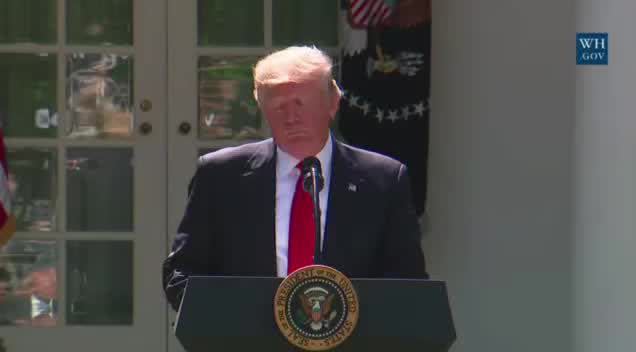
Trump said that, in order to fulfill his "solemn duty" to protect Americans, the U.S. will begin to withdraw from the Paris agreement "but begin negotiations to reenter either the Paris accord or a really entirely new transaction on terms that are fair to the United States, its businesses, its workers, its people, its taxpayers."
His administration "will see if we can make a deal that's fair. And if we can, that's great. And if we can't, that's fine," he said.
Yet the Paris treaty isn’t something that one country or many countries can renegotiate on their own. It’s all or none.
“This is in essence a multilateral agreement. That’s why it took six years to bring together, and no one country can unilaterally change the conditions,” Figueres said. “It’s a very sad, but actually concerning, fact that apparently the White House has no understanding of how an international treaty works.”

Image: TIMOTHY A. CLARY/AFP/Getty Images
Michael Oppenheimer, a climate scientist and member of the U.N.’s Intergovernmental Panel on Climate Change, said the treaty Trump described bore little resemblance to the Paris agreement — which is non-binding and voluntary, and carries no legal punishments. Instead, Trump seemed to be discussing Kyoto, which legally required action from wealthier countries, such as the U.S., but not emerging economies like China.
“It’s completely different from Kyoto, yet they are stuck in this 20-year time warp,” Oppenheimer said in an interview, adding, “And unfortunately we’re stuck in there with them.”
Trump can technically withdraw the U.S. from the Paris agreement, but it won’t happen as immediately as it he made it sound. While any country can leave the pact, a government can’t submit its plans to withdraw to the U.N. until three full years after the country formally adopted it. In America’s case, that means Trump can’t withdraw until Nov. 5, 2019 — and even then it will take another year for the U.S. to officially leave.
3. The Paris agreement places “draconian financial and economic burdens” on U.S. businesses, workers, and families

The Paris agreement doesn’t require the U.S. to do anything it doesn’t want to do. Each nation submits its own plan for reducing emissions, but the U.N. can’t punish it for not following suit.
This lack of real teeth is why environmentalists have criticized the treaty as weak, when compared to the challenge of the climate crisis. But there’s nothing draconian about voluntary and non-binding terms.
4. The Paris agreement will hurt the U.S. economy and destroy jobs
In his speech, Trump cited an analysis that claimed the U.S. commitment under the Paris agreement would cost the U.S. economy nearly $3 trillion and eliminate 6.5 million industrial sector jobs by 2040.
The Obama-era commitment says the U.S. will cut carbon emissions by 26 to 28 percent by 2025, compared to 2005 levels. America is already about halfway toward meeting that target, in large part because cheaper, lower-carbon natural gas has replaced coal as the main U.S. electricity source.
National Economic Research Associates, a consulting firm that often produces anti-regulation studies, conducted the report Trump cited. But the firm assumes “highly unrealistic and unnecessarily expensive” actions are taken to reduce emissions. It also figures that clean energy technologies, such as wind and solar power and electric cars, see no significant cost reductions or innovative advances, making them appear “artificially costly,” according to the nonpartisan World Resources Institute (WRI).
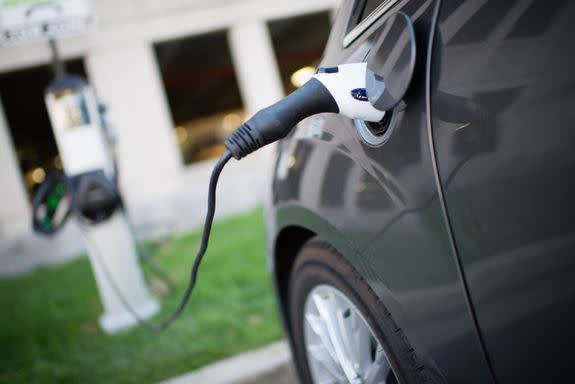
Image: The Washington Post/Getty Images
Many experts have said that, on the contrary, the Paris agreement will boost the U.S. economy by attracting investment and job growth in new clean energy industries. Even as jobs in traditional fossil fuel sectors decline, the broader economy is not expected to fizzle.
Gov. Jerry Brown noted that California’s economy grew 40 percent faster than the rest of the U.S. last year, even as the Golden State carried out aggressive policies for boosting renewable energy, energy efficiency, and zero-emissions vehicles. California has the sixth largest economy in the world, with about $2.46 trillion in gross state product, and its climate policies far outstrip those at the federal level.
“California’s economy and America’s economy are boosted by following the Paris agreement,” Brown told reporters on a call.
5. Under the Paris agreement, China is allowed to build “hundreds of additional coal plants” and boost its emissions over a “staggering” number of years, while the U.S. will have its hands tied, with no chance to build “clean coal” technologies
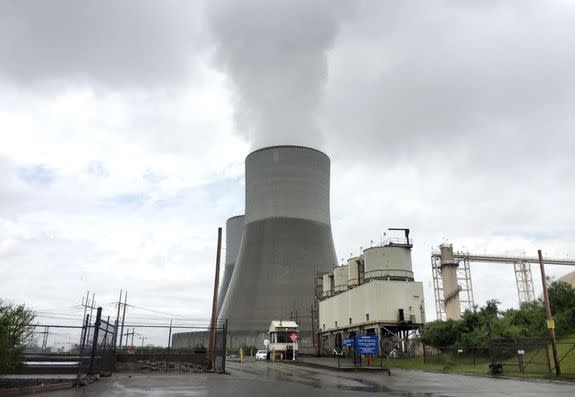
Image: AP/REX/Shutterstock
Once again, the Paris Climate Agreement in and of itself doesn’t dictate what a country can and cannot do. This is not the Kyoto Protocol.
Furthermore, all signs indicate that China is moving in the complete opposite direction of a coal-fired renaissance. In January, the Chinese government canceled plans to build more than 100 coal-fired power plants, in an effort to both reduce greenhouse gas emissions and eliminate the dangerous, dirty smog blanketing its biggest cities.
Under Paris deal, China committed to produce as much clean electricity by 2030 as the US does from all sources today https://t.co/F8Ppr2o7Rl
— Elon Musk (@elonmusk) June 1, 2017
That same month, China’s energy agency said it would spend 2.5 trillion yuan, or $361 billion, on clean energy projects by 2020 to help shift the nation away from fossil fuels. China is also poised to launch the world’s largest carbon trading market later this year with a new cap-and-trade system.
Legally speaking, the U.S. can build all the coal plants it wants under the Paris agreement. But none of them will be clean, because clean coal doesn’t exist.
6. The U.S. will be the “cleanest and most environmentally friendly country on Earth”

Image: AP/REX/Shutterstock
This sounds great, but the Trump administration is doing little to make that actually happen.
So far, the administration, led by EPA Administrator Scott Pruitt, has been rolling back regulations on fuel economy standards for cars and trucks, methane emissions from oil and gas operations, carbon dioxide emissions from power plants, and proposed regulations to improve water quality.
Environmental groups warn that these changes will take the country in the opposite direction, environmentally, compared to Trump’s promise.
7. The U.S. has paid “tens of billions” to the Green Climate Fund, while other countries have barely pitched in. Some of the U.S. funding was “raided out of America’s budget for the war on terrorism”
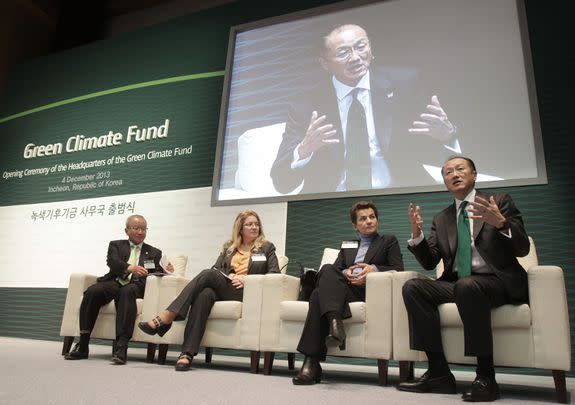
Image: Young-joon/AP/REX/Shutterstock
The U.N.’s Green Climate Fund is designed to transfer financial and technical support from wealthier countries to poorer nations that are most vulnerable to the effects of climate change. In recent years, nearly three dozen governments have formally committed a total of $10.3 billion to the fund.
Of that share, the U.S. has pledged the largest chunk, at $3 billion. But the U.S. is also the world’s largest economy, and on a per-capita basis, its contribution is much smaller than those from northern European countries.
So far, the U.S. State Department has actually contributed $1 billion of the total $3 billion pledge, made in two $500 million payments. The money came from the fiscal year 2016 Economic Support Fund appropriation, which is designated to “promote economic or political stability in areas where the United States has special strategic interests.”
That doesn’t exclusively mean terrorism. And the consequences of climate change will undoubtedly stoke economic hardship and political unrest in all parts of the world, including those where the U.S. has personal interests.
There's also enough funding to fight terrorism even with the climate spending. The U.S. spent about $600 billion on defense in fiscal year 2015, and Trump wants to increase this by another $54 billion next year.
In fact, Defense Secretary James Mattis has warned that the military would face a greater burden due to climate change, making the terrorism vs. climate spending comparison even more ridiculous.
8. America faces a “massive future legal liability” if it stays

Image: NASA
This is based on a flawed understanding of how international law interacts with domestic law. U.S. courts won’t cite the agreement in their decisions, but the administration is worried that it will come into play in pending cases. This is ironic, since they may need to worry more about the consequences of pulling out of the agreement.
In fact, it may soon be argued in court that by leaving Paris unilaterally, the Trump administration is incurring legal liability because it is harming the ability of its citizens to live in a stable climate. A group of 21 young Americans is suing the federal government for failing to act on climate change, with their case currently pending before a judge in Oregon.
WATCH: It's official, 2016 was Earth's warmest year on record
